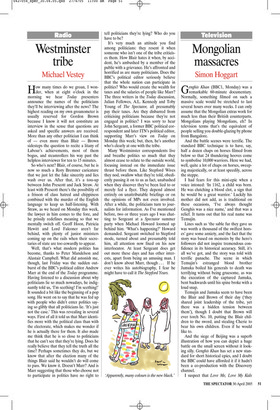Westminster tribe
Michael Vestey
How many times do we groan, I wonder, when at eight o’clock in the morning we hear Today presenters announce the names of the politicians they’ll be interviewing after the news? The highest reading on my own groanometer is usually reserved for Gordon Brown because I know it will not constitute an interview in the sense that questions are asked and specific answers are received. More than any other politician I can think of — even more than Blair — Brown sidesteps the question to recite a litany of Labour’s achievements, most of them bogus, and steamrollers his way past the helpless interviewer for ten to 15 minutes.
So who’s next? Blair, of course, but he is now so much a Rory Bremner caricature that we just let the fake sincerity and lies wash over us. After that, it’s a toss-up between John Prescott and Jack Straw. At least with Prescott there’s the possibility of a frisson of class hatred and chippiness combined with the murder of the English language to keep us half-listening. With Straw, as we heard on Monday this week, the lawyer in him comes to the fore, and he prissily redefines meaning so that we mentally switch off. Geoff Hoon, Patricia Hewitt and Lord Falconer aren’t far behind, with plenty of junior ministers coming up on the rails when their secretaries of state are too cowardly to appear.
Well, that’s what modern politics has become, thanks to Peter Mandelson and Alastair Campbell. What did astonish me, though, last Friday was the sudden outburst of the BBC’s political editor Andrew Marr at the end of the Today programme. Having listened to a discussion about why politicians lie so much nowadays, he indignantly told us, ‘I’m seething! I’m seething!’ It sounded a bit like the beginning of a pop song. He went on to say that he was fed up with people who didn’t enter politics saying so glibly that all politicians lie. ‘It’s just not the case.’ This was revealing in several ways. First of all it told us that Marr identifies more with the political class than with the electorate, which makes me wonder if he is actually there for them. It also made me think that he is so close to politicians that he can’t see that they’re lying. Does he really believe that they tell the truth all the time? Perhaps sometimes they do, but we know that after the election many of the things Blair said he wouldn’t do will come to pass. We know it. Doesn’t Marr? And is Marr suggesting that those who choose not to participate in politics have no right to tell politicians they’re lying? Who do you have to be?
It’s very much an attitude you find among politicians: they resent it when someone who isn’t one of the tribe criticises them. How Blair hates it when, by accident, he’s ambushed by a member of the public with a grievance. He’s affronted and horrified as are many politicians. Does the BBC’s political editor seriously believe that the whole nation can participate in politics? Who would create the wealth for taxes and the salaries of people like Marr? The three writers in the Today discussion, Julian Fellowes, A.L. Kennedy and Toby Young of The Spectator, all presumably pay their taxes. Are they disbarred from criticising politicians because they’re not engaged in politics? I was sorry to hear John Sergeant, a former BBC political correspondent and later ITN’s political editor, supporting Marr’s view on Today on Monday this week; but, then, he’s another who’s clearly at one with the tribe.
Many Westminster correspondents live and breathe politics so much that they almost cease to relate to the outside world, focusing instead on the immediate issue thrust before them. Like Stepford Wives they nod, swallow what they’re told, obediently passing it on to us as fact, unabashed when they discover they’ve been lied to or merely fed a flyer. They depend almost entirely on unattributable briefings or on the opinions of MPs not even involved. After a while, the politicians turn to journalists for information. As I’ve mentioned before, two or three years ago I was chatting to Sergeant at a Spectator summer party when Michael Howard loomed up behind him. ‘What’s happening?’ Howard demanded. Sergeant switched to Stepford mode, turned about and presumably told him, all attention now fixed on his new interlocutor. At least Sergeant does get out more these days and has other interests, apart from being an amusing man. I don’t know about Marr, though ... If he ever writes his autobiography, I fear he might have to call it The Stepford Years.




















































 Previous page
Previous page